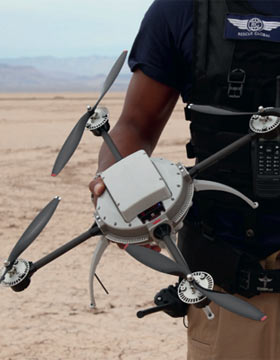Software Agents
An intelligent approach to disaster relief
In the chaotic aftermath of a natural disaster, responders are often unsure whether their resources are being put to best use. Thanks to research being led by Southampton’s Professor Nick Jennings, however, a coordinated army of smart software and aerial drones could change all that.

By gathering information from across an affected area, software agents – algorithms that can work with a degree of autonomy – can build a picture of the situation and give recommendations for how people should direct their efforts to mitigate damage and save lives.
The system is being developed as part of a £10m project, called Orchid, funded by the UK government. Orchid’s software agents come in several forms: they inhabit flying drones with on-board cameras, and servers that sift data arriving from the disaster area in the form of pictures, tweets and sensor readings. The information is then communicated wirelessly to a planning agent that assesses it and makes a suggestion to the person coordinating the aid effort on how to proceed.
Initial testing has shown promising results and, if it works in the field, Orchid could fill an important role in disaster situations, says Paul Donohue of International Rescue Committee UK in London. “It's core to where we are going,” he says. “We are always looking to use more technology to try and ensure that we have all the information necessary after a disaster.”
At a time when humans are becoming increasingly dependent on computers, the Orchid project brings together over 60 researchers from a range of disciplines at the Universities of Southampton, Oxford and Nottingham, together with industrial partners at BAE Systems, Rescue Global, Secure Meters Ltd and the Australian Centre for Field Robotics (ACFR).
Examples of current human interactions with autonomous software agents include the crowd-sourcing that provides a growing element of our traffic information, user-generated content for weather reports, and software that can find us hotels according to our preferences. Orchid promises to be a notable step forward in the development of true partnerships between people and computers.

Find out more
Contact us at work at info@orchid.ac.uk to talk to our research team and find out more about this work. Professor Nick Jennings, of the Orchid Programme led the research on this project.